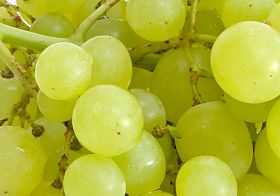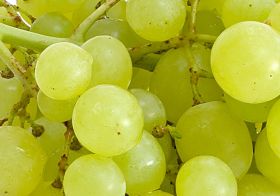Grapes
Grape intake reversed stress-related cognitive, behavioural and biochemical deficits, according to a University of Houston study
Results from a study recently published in the Journal of Nutrition Research have suggested that a grape-enriched diet may help over come the effect of stress.
In the study, researchers observed a protective role of grapes on stress-induced anxiety-like behaviours, and learning and memory deficits in an animal model of post traumatic stress, attributed to both gene activation and enhanced antioxidant activity resulting from grape intake.

This study, conducted at the University of Houston in the US, investigated the protective role of grapes against stress, and the mechanisms by which grapes achieved this.
For the animals on grape-enriched diets, freeze-dried, whole grape powder was added to the drinking water for 3 weeks, followed by either the stress or control exposure, and then behaviour tests.
The results showed that feeding the animals a grape-enriched diet prior to stress exposure successfully countered the detrimental effects of that stress on brain function and behavior. Specifically, grape intake prevented the memory impairment and anxiety-like behaviors that were observed in the rats with stress but no grapes in their diet.
The researchers propose that the protective benefits of grape consumption start with enhanced antioxidant activity that reduces oxidative stress levels: systemic markers of oxidative stress were reduced in the grape consuming group. Once the oxidative stress is minimised, activation of key genes that help promote the survival of brain nerve cells is triggered.
“Grapes appear to influence several processes that support brain health,” said Samina Salim, the lead investigator. “The potential interplay between grapes’ antioxidant activity and their impact on cell communication is very intriguing to us and we intend to study it further.”
New study suggests regular grape consumption could protect the retina from deterioration
New research presented recently at the Association for Research in Vision and Ophthalmology conference in Orlando, Florida, has suggested that regular grape consumption may play a role in eye health by protecting the retina from deterioration.

Specifically, the research said that a grape-enriched diet resulted in a protective effect on retinal structure and function.
The retina is the part of the eye that contains the cells that respond to light, known as photoreceptors. There are two types of photoreceptors: rods and cones. Retinal degenerative diseases affect over 5m people in the US, and can cause blindness due to photoreceptor cell death.
The study was conducted by a research team at the University of Miami, Bascom Palmer Eye Institute, and investigated whether a diet supplemented with grapes could protect the photoreceptors in mice that have retinal degeneration. Mice were either fed a grape-supplemented diet corresponding to 3 servings of grapes per day for humans or one of two control diets.
The results showed that retinal function was significantly protected in the mice consuming the grape-enriched diet. The grape-consuming group had three-fold higher rod and cone photoreceptor responses compared with those on the control diets. They also exhibited thicker retinas. Grape consumption also protected retinal function in an oxidative stress model of macular degeneration. Further analysis revealed that the grape diet resulted in lower levels of inflammatory proteins and higher amounts of protective proteins in the retinas.
“The grape-enriched diet provided substantial protection of retinal function which is very exciting,” said Dr Abigail Hackam, lead investigator of the study. “And it appears that grapes may work in multiple ways to promote eye health from signaling changes at the cellular level to directly countering oxidative stress.”
The Association for Research in Vision and Ophthalmology (ARVO) is the largest eye and vision research organisation in the world with eye and vision research members from over 70 countries.